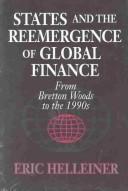| Listing 1 - 1 of 1 |
Sort by
|

ISBN: 1501701975 1501701983 9781501701986 0801428599 0801483336 9780801483332 9780801428593 Year: 1994 Publisher: Ithaca, NY : Cornell University Press,
Abstract | Keywords | Export | Availability | Bookmark
 Loading...
Loading...Choose an application
- Reference Manager
- EndNote
- RefWorks (Direct export to RefWorks)
Most accounts explain the postwar globalization of financial markets as a product of unstoppable technological and market forces. Drawing on extensive historical research, Eric Helleiner provides the first comprehensive political history of the phenomenon, one that details and explains the central role played by states in permitting and encouraging financial globalization.Helleiner begins by highlighting the commitment of advanced industrial states to a restrictive international financial order at the 1944 Bretton Woods conference and during the early postwar years. He then explains the growing political support for the globalization of financial markets after the late 1950s by analyzing five sets of episodes: the creation of the Euromarket in the 1960s, the rejection in the early 1970s of proposals to reregulate global financial markets, four aborted initiatives in the late 1970s and early 1980s to implement effective controls on financial movements, the extensive liberalization of capital controls in the 1980s, and the containment of international financial crises at three critical junctures in the 1970s and 1980s.He shows that these developments resulted from various factors, including the unique hegemonic interests of the United States and Britain in finance, a competitive deregulation dynamic, ideological shifts, and the construction of a crisis-prevention regime among leading central bankers. In his conclusion Helleiner addresses the question of why states have increasingly embraced an open, liberal international financial order in an era of considerable trade protectionism.
International finance. --- Monetary policy. --- State, The. --- Administration --- Commonwealth, The --- Sovereignty --- Political science --- Monetary management --- Economic policy --- Currency boards --- Money supply --- International monetary system --- International money --- Finance --- International economic relations --- International finance --- Monetary policy --- State, The --- bretton woods --- etat --- histoire economique --- marche international financier --- politique monetaire --- 321.2 --- 333.432.8 --- 333.600 --- 333.605 --- 336.61 --- AA / International- internationaal --- staat --- economische geschiedenis --- internationale financiele markt --- monetair beleid --- Economisch beleid van de overheid --- Internationale monetaire organisatie. Internationaal Muntfonds. Algemene leningovereenkomsten --- Financiële markten. Kapitaalmarkten (algemeenheden) --- Nieuwe financiële instrumenten --- Financieel beleid --- Histoire économique --- --Finance --- --1944-1990 --- --International finance --- --International finance.
| Listing 1 - 1 of 1 |
Sort by
|

 Search
Search Feedback
Feedback About
About Help
Help News
News